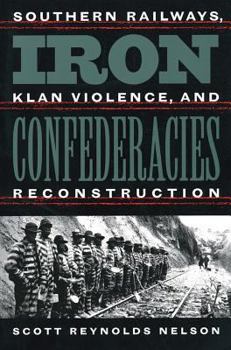Iron Confederacies: Southern Railways, Klan Violence, and Reconstruction
Select Format
Select Condition 
Book Overview
During Reconstruction, an alliance of southern planters and northern capitalists rebuilt the southern railway system using remnants of the Confederate railroads that had been built and destroyed during the Civil War. In the process of linking Virginia, the Carolinas, and Georgia by rail, this alliance created one of the largest corporations in the world, engendered bitter political struggles, and transformed the South in lasting ways, says Scott Nelson. Iron Confederacies uses the history of southern railways to explore linkages among the themes of states' rights, racial violence, labor strife, and big business in the nineteenth-century South. By 1868, Ku Klux Klan leaders had begun mobilizing white resentment against rapid economic change by asserting that railroad consolidation led to political corruption and black economic success. As Nelson notes, some of the Klan's most violent activity was concentrated along the Richmond-Atlanta rail corridor. But conflicts over railroads were eventually resolved, he argues, in agreements between northern railroad barons and Klan leaders that allowed white terrorism against black voters while surrendering states' control over the southern economy.
Format:Hardcover
Language:English
ISBN:0807824763
ISBN13:9780807824764
Release Date:January 1999
Publisher:University of North Carolina Press
Length:272 Pages
Weight:1.00 lbs.
Dimensions:1.0" x 6.1" x 9.3"
Customer Reviews
1 rating
Interpreting post bellum southern development
Published by Thriftbooks.com User , 18 years ago
As the title suggests, Scott Reynolds monograph focuses on Southern railroad development from a political, social and economic perspective. Before the war states rights advocates prevented connecting tracks between the states for fear of losing control of established economic patterns. Rail development was also limited by the shortage of investment capital. To raise money states guaranteed stock by a system called "hypethecation" which made the stock marketable abroad. During the war connecting links were forged out of necessity, but wartime use and shortages left the system in a deplorable state. The author well describes this in the harrowing tale of CSA President Davis and his family evacuating Richmond in 1865. The struggle for control after the Civil War pits the conservative elements, i.e. the Klan, against the new economic opportunity of freedmen. The railroad feeds the violence between the two, sparked in Alamance, NC and Spartenburg, SC. In Reconstruction control is usurped from A. B. Andrews' innovative southern business, the Seaboard Inland Air Line, by a northerner, Tom Scott. He invents the concept of the holding company which served the purpose of shielding those really in power with the result that investors now could confidently put money in securities and not fictional "hypethecated" investments. Money dried up for Southern investors leaving Northerners in control. But peace demanded accommodation. Cotton and tobacco filled rail cars perpetuating staple agricultural and Southern conservatives achieved redemption. On the other hand African Americans suffered a new humiliation in laboring under a convict labor system. Nelson's scope is limited to the important route between Richmond and Atlanta. However it is in this key area that events lead him to his compelling argument that railroads in the south served to limit democratic authority, continued the South's reliance on agriculture, and perpetuated conservative authority. The importance of through freight between the states, despite state imposed political impediments, is evident by the bill of lading. Andrews, in putting together the Seaboard Inland Air Line and using the bill of lading, provided rapid transit by multiple companies. An "air line" was more nebulous and less subject to state regulation and restrictions. Not only that, but a bill of lading was legal title to the freight. Knowledge of how to use this marketing power was found in New York wholesalers, not local merchants transferring control to the north. Nelson's argument that railroads in the south served to limit democratic authority, continued the South's reliance on agriculture, and perpetuated conservative authority adds to other scholars interpretations of post bellum southern development.






